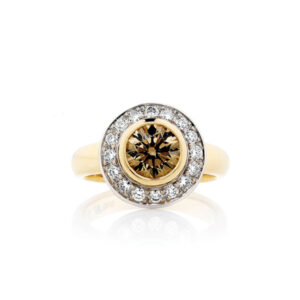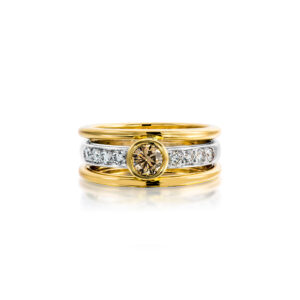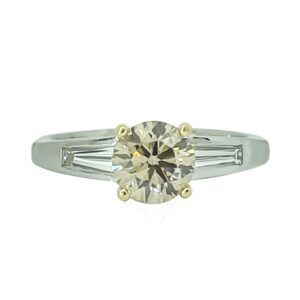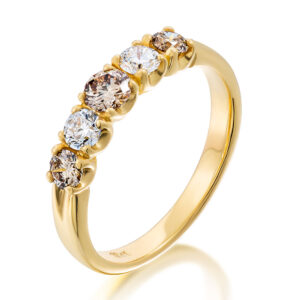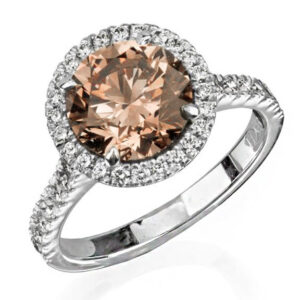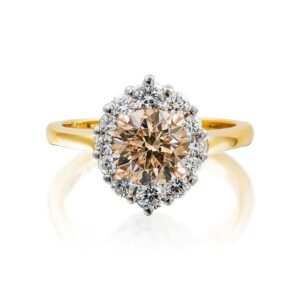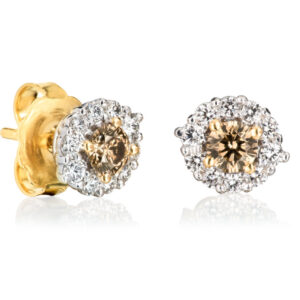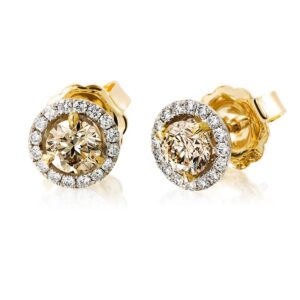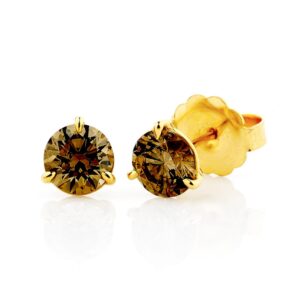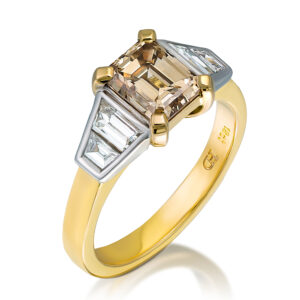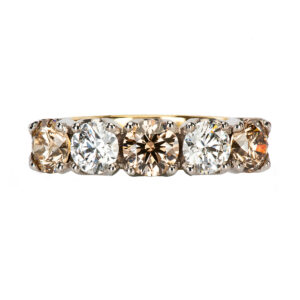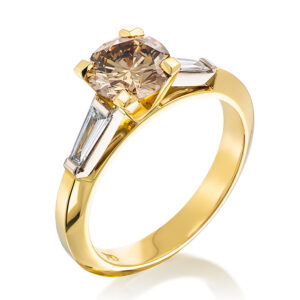Champagne Diamond
COLLECTION
Champagne diamonds originate from Siberia, Australia, and Africa. They are formed in mines from different parts of the world. The largest diamond mine is in Western Australia where all the champagne diamonds were mined. These fancy diamonds often make a stunning engagement ring to celebrate a lifelong journey with your soulmate. The eye-catching champagne engagement ring offers a variety of personalities and sparkle.
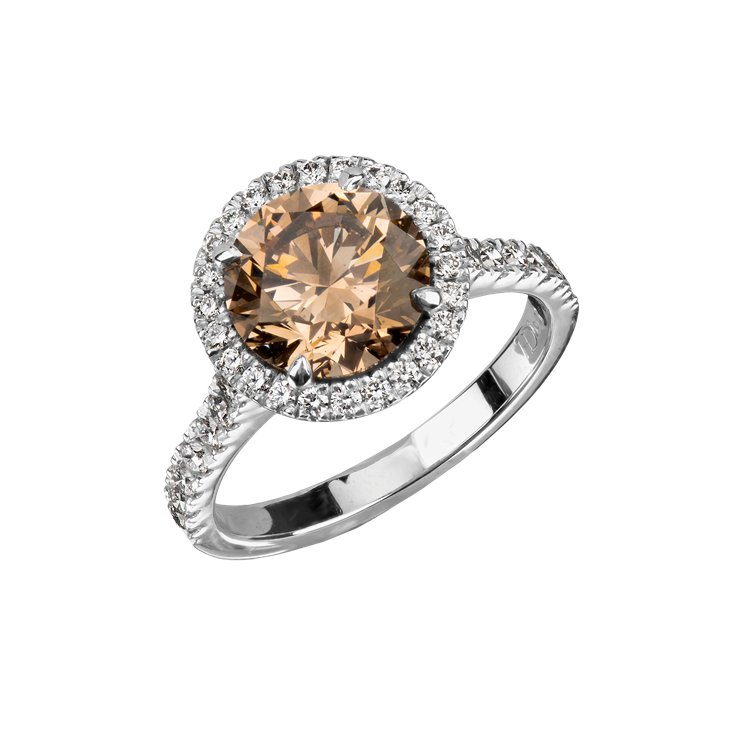
Showing all 12 resultsSorted by latest
-
Round Champagne Halo Ring
-
Brilliant Cut Champagne Bezel Set Solitaire Ring
-
Brilliant Cut Champagne Diamond & Baguettes Ring
-
5 Across Champagne & White Diamond Ring
-
Argyle Champagne Diamond Halo Ring
-
Champagne & White Diamond Cluster Ring
-
Champagne Diamond cluster Earrings
-
Champagne Diamond Halo Stud Earrings
-
Champagne Diamond Stud Earrings
-
Emerald Cut Champagne Diamond Solitaire with Trapezoid Diamonds
-
White Diamond & Champagne Ring
-
Champagne Diamond & tapered baguettes Ring
First Tab - do not remove
Champagne Diamonds
Champagne diamonds exude romance with a timeless sensibility. Champagne diamond rings’ warm golden tones can come in a variety of shades, from very light to very vivid, but each diamond is a piece of art. You can get a variety of custom champagne jewellery pieces such as diamond rings, bracelets, earrings, necklaces, and more.
Are Champagne Diamonds Real Diamonds?
Champagne diamonds are real diamonds and are part of the family of fancy coloured diamonds. Champagne stones are formed in mines from all over the world. That said, the largest diamond mine where coloured diamonds originate is located in Western Australia, which produced argyle champagne diamonds as well as the coveted argyle pink diamond.
Due to nitrogen, a champagne diamond’s crystal lattice forms a unique texture called “graining,” which affects the way the diamond reflects light–this is why we see it as a yellowish-brown colour in the gems of champagne jewellery and in champagne diamond engagement rings.
Are Champagne Diamond Rings or Jewellery More Expensive than White Diamond Jewellery?
Champagne diamonds are less expensive than most colourless diamonds, making them a cost-effective choice for fine jewellery, especially pieces that need more than one diamond. Champagne is less rare than white and yellow diamonds and can cost 50% to 60% less than their colourless diamond counterparts. Still, the price of a champagne diamond ultimately depends on its carat, clarity, cut, and colour.
What Do Champagne Diamond Engagement Rings Symbolise?
Champagne diamonds are believed to connect the wearer to earth and to nature. This special fancy coloured diamond is also said to symbolise order, stability, and clarity, making them an ideal romantic stone to use in pieces that represent relationships, such as engagement rings or wedding rings. Champagne engagement rings can be a perfect choice and stack beautifully with a wedding ring for your significant other.
How Are Champagne Diamonds Graded?
Generally, the quality of champagne diamonds is graded in the same way as other diamonds, which is based on the carat, clarity, cut, and colour of the diamond. The heavier, the more flawless, and the better-cut the champagne diamond is, the more valuable—and costly—the diamond will be.
However, the colour of champagne diamonds is graded on a different scale than white diamonds.
Grading A Champagne Diamond’s Colour
A champagne diamond’s colour grade depends on the colour of the diamond and its intensity level. A champagne diamond is evaluated based on three main components: hue, saturation, and tone.
The hue is the visible colour of the diamond. A champagne diamond’s primary hue is brown, while its secondary hue is yellow, pink, or orange. When its secondary hue enhances or doesn’t detract from its primary hue, then the champagne diamond is more valuable than other coloured diamonds such as argyle pink diamonds or white diamonds. Some champagne jewellery pieces don’t have secondary hues, but these are very rare and usually sold at auctions.
The saturation is the intensity of a diamond’s colour, while the tone is its lightness or darkness. There’s a specific grading system used for the colour of champagne diamonds, which ranges from C1 to C7, where C1 to C2 is considered light, C3 to C4 is medium, C5 to C6 is dark, and C7 is the darkest–these darker diamonds are often referred to as cognac diamonds, which are the most expensive variety of champagne diamonds.
How Can You Tell If a Champagne Diamond Engagement Ring or Jewellery Is Real?
Champagne diamonds are structurally similar to colourless or white diamonds, so you can use the same testing methods to check if the diamond is real, such as testing if it fogs up or scratches. However, the best way to test a diamond is to utilise an experienced diamond tester or ensure you’re shopping at a top-notch jewellery seller like Holloway Diamonds.
To shop for a champagne diamond at Holloway Diamonds, you can schedule an appointment for an in-person consultation with our jewellers or book to experience a virtual consultation. We offer a variety of bespoke champagne jewellery pieces ranging from diamonds rings and earrings to champagne bracelets and necklaces.
What Is a Champagne Diamond?
A champagne diamond is a type of fancy-coloured diamond that’s naturally brown with noticeable tints of yellow. They’re named for their golden champagne-like colour, which ranges from a Prosecco-like light brown to a deep cognac shade.
Champagne diamonds are formed and mined in different parts of the globe, but the largest champagne diamond mine was the Argyle Diamond Mine in Western Australia. These champagne stones contain traces of nitrogen and other elements in their crystal structure, causing their unique hue. The higher the nitrogen content, the deeper the intensity of its brown colour.
Interestingly, champagne diamonds are a fairly recent phenomenon in the commercial jewellery market. Up until the 1980s, champagne stones were only generally considered good for industrial use thanks to their durability; they rank a ten on the Mohs scale of hardness, making them the most durable stones in the world. But Australians started fashioning and setting them into jewellery and marketing them with the prestige of the term “champagne,” which skyrocketed interest. Nowadays, you can find champagne pieces in many mid-priced jewellery designs.
How Much Are Champagne Diamonds Worth?
The cost of a champagne diamond ultimately depends on its colour, clarity, carat, and cut, with its colour bearing the most weight on its price. Generally, the paler the champagne diamond is, the less expensive it will be; the most costly champagne diamonds are those with deep brown hues.
The source and rarity of the champagne diamond will also determine its cost. For example, champagne diamonds mined from the Argyle Diamond Mine in Western Australia tend to command higher prices.
Typically, a one-carat champagne diamond costs between $3,000 to $4,000 (or $5,000 to $6,000 for higher-graded stones). You can get your champagne stone set in gold, yellow gold, white gold, or other precious metal jewellery pieces.
What Is a Cognac Diamond?
A cognac diamond is a brown fancy-coloured diamond (same as champagne or chocolate diamonds) that falls on the end of the colour spectrum; that is, it features the deepest hue of brown, similar to the colour of cognac, from which its name derives.
Cognac Versus Champagne Diamonds
Cognac and champagne diamonds come from the same family of fancy-coloured stones. That makes their make and formation similar, and you can often find them in the same mines. The only main difference is the intensity of their hues, which also affects their prices. Champagne diamonds are paler and more cost-effective, while cognac diamonds have a deeper brown hue and command slightly higher prices.
Champagne Diamonds Versus Chocolate Diamonds
Champagne diamonds and chocolate diamonds are terms used to refer to brown fancy-coloured diamonds. The former usually indicates a paler brown hue with stronger yellow undertones, while the latter is a general marker for brown-coloured diamonds.
That said, the term “chocolate diamonds” isn’t used commercially as it can only be coined by one company: Le Vian. Once Le Vian started sourcing diamonds from the Argyle Diamond Mine, the brand started calling the brown stones “chocolate diamonds” and soon trademarked the term. Still, many consumers continue to say “chocolate diamonds” when shopping for brown-coloured stones.

